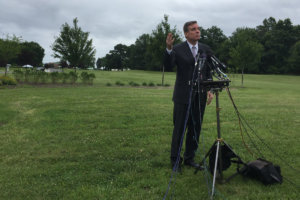BRISTOW, Va. — Children who were separated from their parents at the U.S.-Mexico border after entering the country illegally are being held in facilities all over the nation. Just an hour or so from the U.S. Capitol in D.C. sits one facility in Northern Virginia housing over a dozen of those separated children.
Sen. Mark Warner, D-Va., visited the Youth for Tomorrow private facility in Bristow, Virginia, on Wednesday and told reporters what conditions were like inside after his tour.
“It’s a facility that I’ve visited before that I think is a first-rate facility. I would only hope and pray that all the facilities across the country were of this quality,” Warner said.
Calling it a clean and appropriate environment, Warner said the children are getting the health care and education that they need. They also have access to counseling and can make phone calls.
Youth for Tomorrow serves about 50 domestic at-risk and troubled kids, but through a contract with the U.S. Department of Health and Human Services, it’s also housing about 110 migrant children.

Fifteen of the children were separated from caregivers as part of the Trump administration’s now rescinded “zero tolerance” policy. Warner said those children have been identified and have communicated with either parents or family members.
On average, migrant children at Youth for Tomorrow have been placed with sponsors or reunited with family within 50 days.
It’s unclear what the timeline will look like now in the wake of the zero tolerance policy. Warner complained about authorities not immediately coming up with an expedited process for reuniting people separated at the border when President Donald Trump reversed the order.
Warner also railed against what he called the “misguided policy” of zero tolerance separating children from caregivers. He said he’s demanding to know what percentage of the more than 2,000 children detained nationally have yet to be connected back to or communicate with a parent or relative.
Places around the area that are housing migrant children include two facilities in Maryland and four in Virginia.
Another challenge is that the children’s and families’ situations need to be examined, Warner said, to assure that when kids are reunited with parents or family members, they’re returned to safe environments.
In the meantime, Warner said, “Here at Youth for Tomorrow, we’re seeing, I think, one of the best facilities in the whole nation.”





